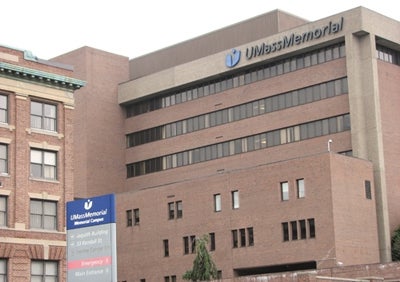Ask those who follow the health and labor markets and they will tell you that Worcester-based UMass Memorial Health Care’s four-month impasse with one of its 1,300-member unions was about more than just a contract.
Big changes are afoot in the health-care industry regionally and nationally and, according to labor experts, that uncertainty is reverberating straight to the bargaining table.
“Attempts to reform health care are starting to be felt in labor relations,” said Gary Chaison, a professor of labor relations at Worcester’s Clark University.
Worcester isn’t the only area in the country dealing with health-care labor issues, according to Chaison. In Minnesota, for example, there’s a nurses’ strike threat that could impact more than 12,000 workers.
“Hospitals are under tremendous pressure to cut costs, which has created an uncertainty between employers and unions, and that leads to confrontation at the bargaining table,” Chaison said.
Local Pressure
For the past four months, members of the United Food and Commercial Workers Local 1445, who mostly work at the UMass Memorial Medical Center in Worcester, have been in contract negotiations with UMass Memorial Health Care, the hospital’s parent group, for a new contract.
The previous contract expired on May 29. Members of the union include laboratory and surgical technicians, anesthesiologist technicians and hospital cleaning staff. It does not include nurses and doctors.
While the union and UMass Memorial did come to an agreement on a new contract on June 2, that only came after tense negotiations and a threatened strike.
During the standoff between labor and management, Douglas Belanger, vice president and business agent for the UFCW Local 1445, characterized negotiations as “professional but not positive.”
Talks between the parties hit a dead-end in mid-May and the union voted 97 percent in favor of authorizing a strike.
In the end, a strike was averted with a last- minute contract approval, but the ordeal is a sign of tense times to come for management in the local health-care industry.
One of the sticking points for the UFCW, according to Belanger, was a desire on the part of workers to remove layers of bureaucracy so that they could do their jobs more efficiently.
He said salary negotiations were a “lesser concern.”
James Kirkpatrick, senior vice president for health-care finance and managed care for the Massachusetts Hospital Association, said he was not privy to the details of the UMass Memorial negotiations and said he could not comment on the specifics of the situation.
But he did say that hospitals around the state are being forced, now more than ever, to take a critical view toward all expenditures.
“Hospitals know they’re facing hard times and great challenges,” Kirkpatrick said. “They always do, but the upcoming year is going to be particularly fraught with problems and challenges.”
Recent pressures from the state government to limit health-insurance rate increases is putting pressure from the public and private sector on hospitals to reduce costs. National health care reform is aimed at reducing the cost of medical care and some politicians are pushing for drastic payment reforms.
As a result, Kirkpatrick said “of course” hospitals will be looking to labor and all other expenses to cut costs.
According to a white paper the MHA put out last year, labor costs are the single most expensive line-item in a hospital’s budget, representing almost two-thirds of hospital expenses.
Hospitals have also been hiring more workers since 2004 and those workers cost more money to employ.
The MHA report shows that wages for nurses have risen almost 50 percent in the four years between 2004 and 2008, while physician compensation has grown by 34 percent.
Julie Pinkham, executive director of the Massachusetts Nursing Association in Canton, which was not involved in the specific negotiations at UMass Memorial, was critical of hospitals, including the UMass Memorial system, crying poor.
She pointed to a $70 million profit UMass Memorial posted last fiscal year, according to state records from the Office of Health Care Finance and Policy. UMass Memorial Medical Center posted a $9 million surplus in the first quarter of 2010 and the hospital is sitting on $182 million in net assets.
She said while labor costs have been going up, so too have revenues for hospitals.
The nursing association released its own study last year showing that the percentage of a hospital’s budget spent on nursing salaries has remained steady at just below 20 percent for the last three years.
“Every time there is a change in the industry the sky starts to fall again, and every year they make more and more profits,” she said.
But others in the industry say this time is different.
Dennis Irish, vice president of marketing, government and community relations for Vanguard’s New England and Chicago markets, which operates Saint Vincent Hospital and the MetroWest Medical Center in Framingham and Natick, said business as usual will be no more.
“If we’re going to do something about the cost of health care, it’s very reasonable to assume that what we’ve done in the past cannot continue,” said Irish.
“At the same time, we need to balance that in making sure that employees are paid a fair and reasonable wage.”
The UMass Memorial situation was not the only labor dispute in the city in recent months.
Since last fall, Sodexho food service workers at Clark University have been attempting to organize as a union.
The move is part of a national effort by Sodexho employees around the country to unionize, according to Adriana Fieldman, a field director for the local Service Employees International Union Local 615, which is working with the Clark employees.
Talks between national SEIU officials and Sodexho could begin this summer, she said, but as of now the workers remain without a union.
“We’ll keep fighting,” Fieldman said.
She said she expects Sodexho workers at Clark to pick up demonstrations again this summer at events where Sodexho officials are making public appearances.

